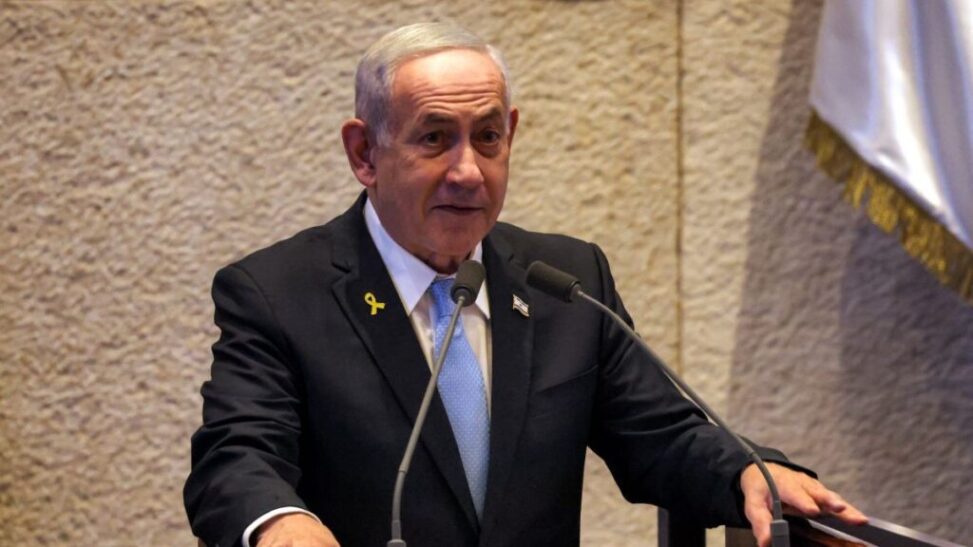Netanyahu has always sought more than just a halt to Iran’s nuclear program. In the current war, Tel Aviv sees a historic opportunity to finally bring down the Islamic Republic.
“The Iranian regime has never been weaker. This is your moment – Iranians – to rise up, make your voices heard. We stand with you.”
— Benjamin Netanyahu, 13 June 2025
Since the 1990s, Israeli Prime Minister Benjamin Netanyahu has been unwavering in his strategic objective: stopping Iran’s nuclear program. At a time when even Washington was focused on peace deals and settlements with the Palestinians, Netanyahu was already fixated on Iran.
He criticized the peace agreement with the Palestinians but consistently highlighted the “Iranian threat.” At a time when this issue was not a global or regional priority, Netanyahu stood almost alone in warning against Iran’s nuclear ambitions.
In the early 2000s, while Israeli prime minister Ariel Sharon focused on crushing the Al-Aqsa Intifada and what he called “Palestinian terrorism,” Netanyahu was simultaneously warning about Iran’s nuclear ambitions. Sharon viewed Iran as an international problem to be handled globally, but Netanyahu sought unilateral confrontation.
Netanyahu has always wanted to leave his mark on Jewish history and to be remembered as the leader who neutralized the “Iranian nuclear threat.”
Foiled plans and revived ambitions
By 2010, Netanyahu and then-defense minister Ehud Barak ordered the Israeli military to prepare strikes against Iranian nuclear sites and assassinate Iranian scientists. The operation stalled only because key security leaders pushed back: Chief of staff Gabi Ashkenazi, Shin Bet head Yuval Diskin, and Mossad chief Meir Dagan all warned that Israel lacked the military capacity to hit Iran without US backing.
The Obama administration, alerted by Barak, pivoted toward diplomacy and sealed the Joint Comprehensive Plan of Action (JCPOA) with Tehran. Netanyahu fumed. But the dream of bombing Iran never faded. He continued this effort on the international stage – even using the UN General Assembly to display a cartoon of a bomb, warning of Iran passing the red line in uranium enrichment.
During Donald Trump’s first term, Netanyahu succeeded in convincing him to withdraw from the nuclear deal after exposing Iran’s “stolen nuclear archive.” To sustain political and military momentum, Netanyahu ordered the military to prepare for a strike on Iran without external aid, citing the motto he often repeats: “The fate of the only Jewish state in the world cannot be entrusted to strangers, even if they are our allies.”
Tel Aviv then ramped up targeted killings and cyber attacks. The 2020 assassination of Mohsen Fakhrizadeh (who had been on Mossad’s hit list since 2009), Iran’s top nuclear scientist, was a message: Israel’s war on Iran had entered a new phase.
The Israel–Iran confrontation has never ceased. Netanyahu remains the architect of this conflict. Even after he became opposition leader in the Knesset under the Naftali Bennett-Yair Lapid government, former Israeli prime minister Bennett upheld Netanyahu’s stance, stating that “a thousand stabs” must be directed at the “head of the axis” – meaning Iran. Thus, Netanyahu has ingrained the Iranian file into Israel’s daily political life – no prime minister can ignore it.
From covert war to open confrontation
The Hamas-led Operation Al-Aqsa Flood deepened Israeli fears. Tel Aviv responded with escalations on multiple fronts: Gaza, Lebanon, Syria, Yemen, and covertly, Iran. The occupation state exploited regional shifts – weakened Syrian air defenses and a new corridor via Iraq – to strike deeper into Iranian territory.
Tel Aviv believes it made a strategic mistake by not striking Iran in 2010; now, Iran’s nuclear sites are more fortified and its defenses stronger. Some Israeli analysts argue that if Tehran achieves nuclear weapons, it and its allies would become bolder, forcing Israel to act to prevent a genuine existential threat.
The current war is a culmination of Netanyahu’s decades-long obsession. Israeli media now admits that Operation Lion’s Courage is targeting Iranian scientists, nuclear facilities, Islamic Revolutionary Guard Corps (IRGC) sites, and military personnel. But the ambition runs deeper.
The regime-change blueprint
As documented by Israeli think tanks and strategic planners, the long-term goal is regime change: dismantle the Islamic Republic, install a friendly government, and shatter the Axis of Resistance. Some argue that with Supreme Leader Ali Khamenei aging, the system is vulnerable.
Others advocate even more radical steps: a decapitation strike on Iran’s leadership combined with attacks on oil infrastructure to ignite domestic unrest. The risks are enormous, but Tel Aviv sees this as a historic opening.
This is no longer a shadow war. For the first time, Israel has openly struck deep into Iranian territory, triggering direct retaliation. Western powers have rushed to defend the Occupation State, but the trajectory is spiraling.
Israel is betting it can absorb an Iranian response, fracture the Islamic Republic, and rewrite West Asian power equations for decades to come.
But Iran is not isolated, and Netanyahu may be overreaching. Though battered and stretched across multiple fronts, the Axis of Resistance – from Hezbollah to Ansarallah to Iraqi factions – is mobilized. The region is bracing for a wider confrontation.
Netanyahu sees a window. Tehran sees not just one, but too many red lines crossed. The rest of West Asia sees a war that could redraw the map.
Source: The Cradle
War against Iran. The nuclear pretext. (EKAI Center, 06.15.2025)
